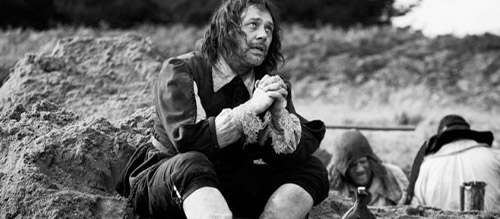A Field in England (2013) Review
A Field in England (2013)
Director: Ben Wheatley
Screenwriter: Amy Jump
Starring: Reece Shearsmith, Michael Smiley, Richard Glover, Ryan Pope, Peter Ferdinando, Julian Barratt
There’s no doubt that Ben Wheatley is one of the most distinctive, original and prolific British filmmakers working today. His uncompromising, often brutal and hard to pin down filmography makes him a somewhat divisive auteur to cinephiles and a provocateur to any casual viewer who might stumble across one of his movies on late night Film4. He has also worked across many genres, often hybridising them to a level only matched by Bong Joon-ho. His feature debut Down Terrace may have been a pretty straight gangster film, but Kill List started as a hit-man movie and morphed into an occult horror, Sightseers was the darkest and most violent of romantic comedies and High-Rise was a sci-fi satire with revolution on its mind.
In 2013, Wheatley released A Field in England. This strange historical hallucinogenic trip had all of his directorial hallmarks but was presented in a mundane setting with an unapologetically strange, bordering on avant-garde, style. You have to really pay attention to this one, and even then you might get hopelessly lost in this bleak expanse of English countryside.
In the aftermath of a battle in the English Civil War, astrologer’s assistant and deserter Whitehead (Reece Shearsmith) flees for his life, but driven by guilt he is compelled to complete a mission of justice assigned by his master. He falls in with three other deserters, and eventually tracks down the man he was tasked to arrest (Michael Smiley). Far from coming quietly, O’Neil instead sets this merry band to digging for treasure that may or may not be there in an unremarkable field.
A Field in England‘s release strategy was way ahead of its time. Half a decade ago, before studios started doing it out of necessity, this film was released in the cinema, on DVD and on Film 4 on the same day. Wheatley adopted a similar strategy five years later when Happy New Year, Colin Burstead found a home on BBC iPlayer for a full year. Clearly Wheatley doesn’t so much mind how you watch his movies, only that you do.
The influences of Ridley Scott, Stanley Kubrick and Nicholas Roeg are clear. From Scott, Wheatley takes economical realisation of a battle scene on a budget (as Scott achieved in his debut The Duellists) – all you need is smoke, sound effects and your actors’ performances. From Kubrick and Roeg, Wheatley constantly plays with the passage of time and warped character perception.
Whitehead may see himself as the intellectual superior of the group (Amy Jump’s well-honed screenplay gives him more flowery exclamations to contrast his companions’ earthy utterances like “I’m not a soldier – I’m not accustomed to this trajectory!”) but they all find themselves on the lowest rung of 17th Century English society.
Just when it looks like we’re on a conventional find-a-lost-man movie, the magic mushrooms come out and things get really weird. The ragtag quartet start tugging on a rope seemingly attached to nothing, then all of a sudden Michael Smiley materialises lying in the dirt. There are pretty explicit implications of occult or paranormal activity going on, though it could of course all be going on in the heads of men who are either under the influence or driven over the edge by guilt.
Monochrome, surreal editing effects and performance art turns by the actors leads one to suspect that this might be more appropriate as a piece projected onto a gallery wall, though even on a small screen you’ll be transfixed. The most striking recurring image is when the action stops to have the characters pose like perplexed Restoration-era paintings as their subjective reality squirms around them.
The scene that fans of the film keep talking about is horrifying and fascinating. It’s really the unknowable centerpiece of the film. O’Neil takes Whitehead into a tent where… something involving a lot of blood-curdling screaming happens. Soon Shearsmith emerges staggering, attached to a rope and with the most deranged, rictus grin on his face. Smiley follows holding the rope, and his victim guides him to their dig site. Somehow O’Neil using some dark power seems to have turned Whitehead into a human metal detector.
In its second half, A Field in England becomes a hypnotically incomprehensible film, and though it’s a tough one to decipher, that’s part of the appeal. However much you actually understand what happens in this field, and whatever your interpretation of events, it’s a fascinating trip. Whether it’s your bag or not, anyone can appreciate the standout performances from Shearsmith and Smiley, and the film’s visuals and soundscape are like nothing else.
Score: 22/24
Recommended for you: Ben Wheatley Movies Ranked


